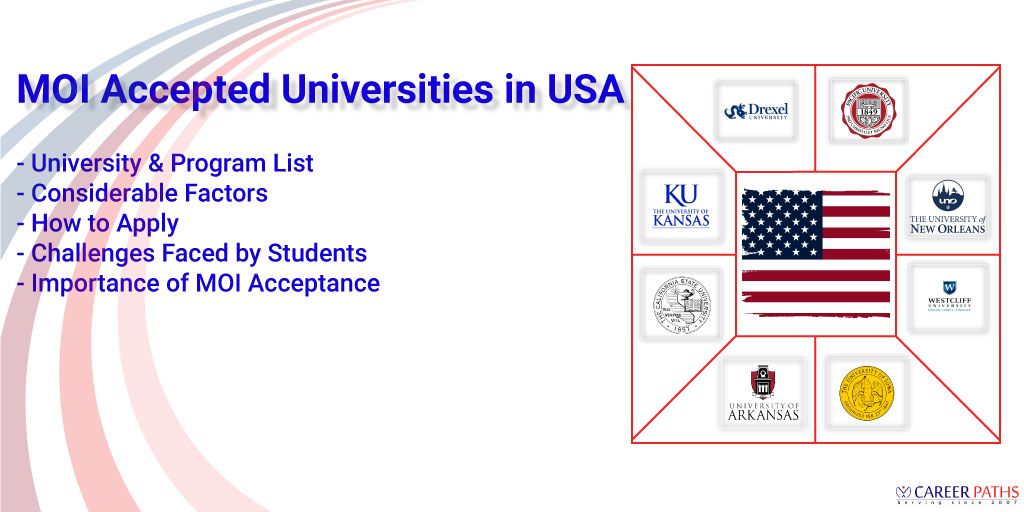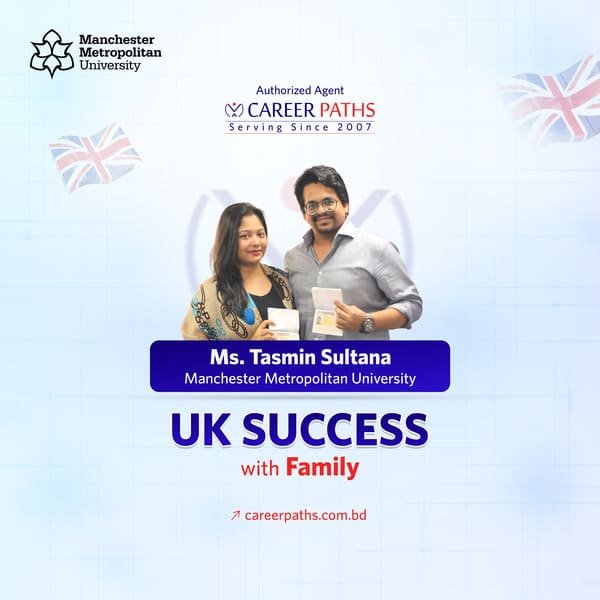
Hi there, Today I’m gonna tell you about
1. MOI accepted USA University List,
2. Academic programs,
3. Factors Before Choosing a University,
4. How to apply,
5. Importance of MOI
6. Important FAQs on MOI
MOI, which stands for Medium of Instruction, refers to the language in which a student has been taught throughout their academic career. It is a crucial factor to consider when applying to universities in the United States. US universities highly value the medium of instruction as it provides insights into an applicant’s language proficiency and ability to excel in an English-speaking academic environment. Demonstrating fluency in English through the medium of instruction is often an essential requirement for admission to US universities. Admissions committees consider MOI as an indicator of a student’s readiness to engaging rigorous coursework and effectively communicate their ideas.
Furthermore, a strong MOI in English enhances the overall academic experience for international students, allowing them to fully comprehend lectures, actively participate in discussions, and produce high-quality assignments.
Therefore, it is important for prospective students to carefully select MOI accepted universities in the US to ensure their academic and linguistic preparedness aligns with the university’s requirements and expectations. By choosing an institution that values MOI, students can enhance their educational journey and maximize their chances of success in a highly competitive academic environment.
List of MOI accepted Universities in USA
Many universities in the United States recognize the Medium of Instruction (MOI) and accept students from various educational systems around the world. These universities understand the importance of a student’s language proficiency and adaptability to an English speaking academic environment.
By recognizing MOI, they value the knowledge and skills gained by students through their previous education. This recognition allows students to showcase their academic achievements and language proficiency when applying for admission. It also ensures that students can effectively engage in coursework, discussions, and research activities at the university level. Students can explore a wide range of universities in the US that appreciate and accept MOI, providing them with opportunities to pursue their higher education goals in a supportive and inclusive academic setting.
University Name | State/ Region | Ranking | Fees (USD $) |
Philadelphia, | 721-730 | $57,136 per year | |
Longbeach, | 1401+ | 39,881 | |
Fayetteville, | 1001-1200 | 24,523 | |
Boulder, Colorado | 320 | 37,146 | |
Iowa City, Iowa | 596 | 30,674 | |
New Orleans, | — | 30,206 | |
Forest Grove, Oregon | — | 50,700 | |
Irvine, California | — | 26,540 | |
Lawrence, Kansas | 452 | $25,000 |
Academic programs at MOI recognized universities
University | Location | Program offered | Duration | Fees (USD $) |
Philadelphia, Pennsylvania | -MSc Biomedical Science | -2 years | $ 30,160 | |
-MSc Business Analytics | -1 year | $ 40,955 | ||
-MSc Economics | -1.5 years | $ 28,465 | ||
-MSc Engineering Management | -2 years | $ 31,960 | ||
-MSc Finance | -1.5 years | $ 34,130 | ||
-MSc Marketing | -1.5 years | $ 34,130 | ||
-MSc Computer Science | -2 years | $ 30,160 | ||
-BA/ BS in Accounting | -4 years | $ 75,460 | ||
-BA in English | -4 years | $ 75,460 | ||
-BS DIgital Media | -4 years | $ 75,460 | ||
-BS Environmental Science | -4 years | $ 75,460 | ||
-BA/ BS Chemistry | -4 years | $ 75,460 | ||
-BS Civil Engineering | -4 years | $ 75,460 | ||
Longbeach, California | -BA Economics | -4 years | $ 17,720 per year | |
-BS Computer Science | -4 years | $ 17,720 per year | ||
-BS Biology | -4 years | $ 17,720 per year | ||
-BS Accounting | -4 years | $ 17,720 per year | ||
-BS Marketing | -4 years | $ 17,720 per year | ||
-MA Economics | -1.5 years | $ 16,275 | ||
-MPH Public Health | -1 year | $ 16,275 | ||
-MSc Chemistry | -1 year | $ 16,275 | ||
-MSc Biology | -1 year | $ 16,275 | ||
-MSc Computer Science | -1 year | $ 16,275 | ||
-MA Geography | -1 year | $ 16,275 | ||
Fayetteville, Arkansas | -MAcc Accountancy | -1 year | $ 38,910 per year | |
-MSc Finance | –1 year | $ 38,910 per year | ||
-MBA Master of Business Administration | -2 years | $ 18,625 | ||
-MSc Supply Chain Management | -1 year | $ 38,910 | ||
– MA Economics | -1 year | $ 38,910 | ||
-MSc Environmental Engineering | -1 year | $ 28,525 | ||
-MSc Computer Engineering | -1 year | $ 28,525 | ||
-BSc in Business Administration | -4 years | $ 30,000 | ||
-BA Communication | -4 years | $ 30,000 | ||
-BSc Computer Science | -4 years | $ 30,000 | ||
-Bachelors in Nursing | -4 years | $ 35,000 | ||
Boulder, Colorado | -MA Anthropology | -2 years | $ 33,210 | |
-MSc Civil Engineering | -1 year | $ 36,220 | ||
-MSc Engineering Management | -2 years | $ 36,220 | ||
-MSc Accounting | -1 year | $ 18,235 | ||
-MSc Finance | -1 year | $ 18,235 | ||
-MSc Environmental Studies | -1 year | $ 33,210 | ||
-BS in Creative Technology & Design | -4 years | $ 43,000 | ||
-BS in Electrical Engineering | -4 years | $ 43,000 | ||
-Bachelor of Marketing | -4 years | $ 43,500 | ||
-BA in Economics | -4 years | $ 40,000 | ||
-BS in Environmental Engineering | -4 years | $ 43,000 | ||
Iowa City, Iowa | -MA Communication Studies | -2 years | $ 31,050 | |
-MA English Education | -1 year | $ 32,915 | ||
-MSc STEM Education | -2 years | $ 10,720 | ||
-Master Public Health | -1 year | $35,300 | ||
-MSc Data Science | -1 year | $31,050 | ||
-MSc Statistics | -1 year | $ 31,050 | ||
-MSc Urban & Regional Planning | -1 year | $ 30,835 | ||
-LLM Masters of Law | -1 year | $ 30,635 | ||
-BSE Biomedical Engineering | -4 years | $ 31,050 | ||
-BS Informatics | -4 years | $30,000 | ||
-BSE in Electrical Engineering | -4 years | $ 31,050 | ||
-BBA in Marketing | -4 years | $ 31,575 | ||
-BS Nursing | -4 years | $ 40,020 | ||
-BS International Relations | -4 years | $ 36,350 | ||
-BS Political Science | -4 years | $ 36,350 | ||
-BS Economics | -4 years | $ 36,350 | ||
New Orleans, Louisiana | -BS Computer Science | -4 years | $ 27,980 per year | |
-BS Accounting | -4 years | $ 27,980 | ||
-BS Electrical Engineering | -4 years | $ 27,980 | ||
-BS Physics | -4 years | $ 27,980 | ||
-BS Hotel, Restaurant and Tourism | -4 years | $ 27,980 | ||
-BS Finance | -4 years | $ 27,980 | ||
-MS Civil Engineering | -2 years | $ 28,460 | ||
-MS Accounting | -2 years | $ 28,460 |
Factors Before choosing a MOI accepted University in 2025
When choosing a MOI accepted university, there are several factors to consider. Firstly, it is important to assess the university’s academic reputation and accreditation to ensure the quality of education. Look for universities with strong faculty and relevant programs in your field of interest. Secondly, consider the university’s location and the opportunities it offers for internships, research, and networking in your desired industry. Additionally, evaluate the university’s support services for international students, including language support, cultural integration programs, and student organizations. It is also essential to review the university’s admission requirements and ensure that your qualifications align with their criteria. Finally, consider the cost of tuition and available financial aid or scholarships. By carefully considering these factors, you can choose a MOI accepted university that not only values your educational background but also provides a conducive environment for your academic and personal growth
University’s academic reputation and accreditation: The academic reputation and accreditation of a university play a crucial role in shaping the educational experience and future prospects of students. A university’s academic reputation reflects its standing within the academic community and its track record of producing successful graduates. It serves as an indicator of the quality of education and research offered by the institution. Accreditation, on the other hand, ensures that the university meets certain standards of academic excellence and provides a recognized and credible qualification. A university with a strong academic reputation and proper accreditation instills confidence in students, as it signifies that their degree holds value and is recognized by employers and other academic institutions. Furthermore, a reputable and accredited university often attracts top faculty and researchers, fostering an environment of intellectual growth and cutting-edge knowledge. Students can benefit from access to resources, mentorship opportunities, and networking connections that can enhance their learning experience and broaden their career prospects. Therefore, considering a university’s academic reputation and accreditation is essential for students seeking a high-quality education and a solid foundation for their future endeavors.
Strong Faculty and Program: Strong faculty and program’s are integral to the success and reputation of universities. A robust faculty comprises experienced professors, scholars, and experts in their respective fields who bring a wealth of knowledge and practical expertise to the classroom. These dedicated educators serve as mentors, guiding students through their academic journey and inspiring them to excel. A strong faculty not only imparts theoretical knowledge but also fosters critical thinking, problem-solving skills, and a passion for lifelong learning. Additionally, universities with well-designed and comprehensive programs cater to the diverse needs and interests of students, offering a wide range of disciplines and specializations. Such programs provide students with a solid foundation in their chosen field and equip them with the necessary skills and knowledge to thrive in the professional world. Moreover, strong faculty and programs facilitate research and innovation, driving advancements in various fields. Students benefit from engaging in cutting-edge research and practical experiences, preparing them for real-world challenges. Therefore, universities that prioritize strong faculty and programs create an environment that nurtures intellectual growth, promotes academic excellence, and prepares students for successful careers and meaningful contributions to society.
Location of University: The location of a university plays a significant role in shaping the overall educational experience and opportunities available to students. A well-chosen location offers numerous advantages and benefits. Firstly, it provides access to a vibrant and diverse community, enabling students to engage with people from different backgrounds and cultures. This exposure fosters a broader perspective, cultural understanding, and the development of interpersonal skills. Secondly, a strategic location often means proximity to industry hubs, business centers, and research institutions, facilitating collaboration, internships, and networking opportunities. Students can tap into a wealth of resources, professional connections, and potential career prospects. Thirdly, a university located in a thriving city or region offers a rich cultural and social environment. Students can explore museums, art galleries, theaters, and participate in various recreational activities. This exposure to a vibrant lifestyle enhances personal growth, creativity, and well-being. Moreover, the location may boast natural beauty and outdoor spaces, providing opportunities for relaxation, recreation, and a healthy work-life balance. Lastly, a university’s location can offer practical advantages, such as access to transportation networks, amenities, and infrastructure, making student life more convenient and comfortable. Overall, the location of a university is more than just a geographical aspect; it contributes to the holistic development of students, expands their horizons, and enhances their educational journey.
Opportunities for internships, research, and networking: Opportunities for internships, research, and networking are crucial for universities to ensure a well-rounded and comprehensive educational experience for their students. Firstly, internships provide practical exposure and real-world application of knowledge gained in the classroom. By engaging in internships, students can develop essential skills, gain industry insights, and establish professional connections that can greatly enhance their employability upon graduation. Secondly, research opportunities allow students to delve deeper into their fields of study, foster critical thinking, and contribute to the advancement of knowledge. Engaging in research nurtures curiosity, analytical abilities, and problem-solving skills, preparing students for future academic or professional endeavors. Additionally, networking opportunities connect students with professionals, alumni, and experts in their respective fields, creating invaluable connections and mentorship possibilities. Networking events, workshops, and guest lectures enable students to expand their professional network, gain insights from industry leaders, and explore potential career pathways. By providing these opportunities, universities empower students to bridge the gap between theory and practice, cultivate essential skills, and foster a competitive edge in the job market.
University’s support services for international students:
Support services for international students, including language support, cultural integration programs, and student organizations, play a pivotal role in ensuring a positive and enriching educational experience. Firstly, language support programs provide a crucial lifeline for international students who may face language barriers upon their arrival. These programs offer language classes, tutoring, and language exchange opportunities, empowering students to improve their language skills and effectively navigate academic and social environments. Secondly, cultural integration programs create a welcoming and inclusive atmosphere for international students, helping them adjust to a new cultural context. These programs offer orientation sessions, cultural events, and cross-cultural workshops, fostering mutual understanding, appreciation, and friendship among diverse student communities. They provide a platform for cultural exchange, breaking down stereotypes, and building bridges of friendship and collaboration. Lastly, student organizations dedicated to international students offer a sense of community, support, and belonging. These organizations provide social activities, peer mentoring, and a platform for cultural expression, allowing international students to connect with like-minded individuals and celebrate their unique identities. By providing comprehensive support services, universities ensure that international students can thrive academically, socially, and culturally, facilitating their integration into the university community and contributing to their personal and academic success.
University’s admission requirements
Considering a university’s admission requirements is of utmost importance when choosing the right educational institution. These requirements serve as a standard that helps ensure that students admitted to the university are well-prepared and have the necessary qualifications to succeed in their academic pursuits. By setting specific admission criteria, universities can maintain the quality and integrity of their programs, creating an environment conducive to learning and academic excellence. Admission requirements also help prospective students gauge their own eligibility and suitability for a particular university, enabling them to make informed decisions about their educational journey. Additionally, these requirements provide a level playing field for all applicants, ensuring fairness and transparency in the selection process. Universities carefully consider factors such as academic achievements, standardized test scores, personal statements, and letters of recommendation to assess the potential of applicants. By considering admission requirements, students can align their aspirations and capabilities with the university’s expectations, increasing their chances of a fulfilling and successful academic experience.
Cost of tuition and available financial aid or scholarships
Considering the cost of tuition and the availability of financial aid and scholarships is crucial when selecting a university. Higher education is a significant investment, and understanding the financial implications is essential for students and their families. By assessing the cost of tuition, students can evaluate their affordability and make informed decisions based on their financial capabilities. Financial aid and scholarships play a vital role in making education more accessible and affordable for students from diverse backgrounds. They can significantly alleviate the financial burden associated with tuition fees, textbooks, and other educational expenses. Scholarships provide opportunities for meritorious students to pursue their academic goals without the heavy burden of student loans. They not only reduce financial stress but also recognize and reward students for their achievements. By considering the availability of financial aid and scholarships, prospective students can explore various funding options and identify the ones that align with their financial needs and academic goals. Ultimately, factoring in the cost of tuition and exploring financial aid opportunities helps students make a well-rounded decision that promotes financial stability and supports their educational aspirations.
How to apply to a MOI accepted university in the USA
Applying to a MOI (Ministry of Education) accepted university in the USA opens up a world of opportunities for international students seeking quality education and global exposure. The application process requires careful planning, organization, and attention to detail. From researching the universities that hold MOI acceptance to preparing the necessary documents and submitting the application, each step plays a crucial role in ensuring a smooth and successful application. By understanding the requirements and following the prescribed guidelines, aspiring students can navigate the application process with confidence and increase their chances of securing admission to a renowned American institution.
Applying to a MOI (Ministry of Education) accepted university in the USA involves a series of steps. Here is a step-by-step process to guide you through the application:
- Research: Start by researching and identifying the MOI accepted universities in the USA that offer the program you are interested in. Look for universities that align with your academic and career goals.
- Review Admission Requirements: Visit the university’s official website and carefully review the admission requirements. Take note of the required documents, deadlines, and any specific criteria for international students.
- Gather Required Documents: Begin gathering the necessary documents, which typically include academic transcripts, standardized test scores (such as SAT or ACT), letters of recommendation, a statement of purpose, and proof of English proficiency (such as TOEFL or IELTS scores).
- Prepare Personal Statement: Write a compelling personal statement that highlights your academic achievements, career aspirations, and why you are interested in studying at the particular university. Tailor your statement to showcase your passion, experiences, and how you can contribute to the university community.
- Submit Online Application: Complete the online application form provided by the university.
- Pay Application Fee: Pay the required application fee as specified by the university. This fee is often non-refundable and covers the processing of your application.
- Submit Required Documents: Upload or mail all the required documents to the university’s admission office. Ensure that you follow the specified format and guidelines for document submission.
- Monitor Application Status: After submitting your application, keep track of your application status through the university’s online portal. This will allow you to stay updated on any additional requirements or notifications from the university.
- Await Admission Decision: The university will evaluate your application and notify you of their admission decision. This process may take several weeks or months, so be patient during this waiting period.
- Enrolment: Upon receiving an offer of admission, it is essential to thoroughly review the acceptance letter and any accompanying information pertaining to enrollment. Follow the instructions provided to officially accept the offer and proceed with the enrollment process, which may include submitting a deposit and confirming your intention to enroll
Remember to carefully adhere to the specific instructions and deadlines provided by each university, as they may vary. It is also advisable to reach out to the university’s international student office for any additional guidance or support throughout the application process.
Challenges faced by international students studying in the USA
Studying in the USA as an international student presents a host of challenges that go beyond the pursuit of academic excellence. From cultural adjustment and academic rigor to financial constraints and social integration, international students often encounter various hurdles during their educational journey. Navigating these challenges requires resilience, adaptability, and a proactive approach to ensure a successful and fulfilling experience in the United States. International students studying in the USA often face various challenges during their academic journey. Some of the common challenges include:
- Cultural Adjustment: Adapting to a new culture, social norms, and language can be overwhelming for international students. They may experience homesickness, language barriers, and difficulties in understanding local customs and traditions.
- Academic Rigor: The educational system in the USA may differ from what international students are accustomed to. The high level of academic rigor, independent learning, and different teaching styles can pose challenges initially.
- Financial Constraints: Tuition fees and living expenses in the USA can be substantial, and international students may face financial challenges in managing their expenses. Limited job opportunities and restrictions on working hours can add to the financial burden.
- Social Integration: Building a social network and establishing connections with domestic students can be challenging. International students may feel isolated or struggle to find a sense of belonging due to cultural differences and language barriers.
- Visa and Immigration Regulations: Navigating the complex visa and immigration regulations can be daunting. Students need to maintain their visa status, keep track of document requirements, and adhere to immigration laws throughout their stay.
- Health Insurance and Healthcare: Understanding the healthcare system and obtaining appropriate health insurance coverage can be challenging for international students. Accessing quality healthcare services and managing medical expenses can also be a concern.
- Career Opportunities: International students may face difficulties in finding internships or job placements due to work authorization restrictions and competition in the job market. Understanding the visa options and networking effectively can help overcome these challenges.
Despite these challenges, international students studying in the USA also have the opportunity to develop valuable skills, experience diverse cultures, and gain a globally recognized education, which can greatly enhance their personal and professional growth.
The importance of Medium of Instruction (MOI) acceptance for international students planning to study in the USA cannot be overstated. MOI acceptance ensures that students have the necessary language proficiency to comprehend lectures, actively participate in discussions, and excel academically. It facilitates integration into the academic community, enhances the overall learning experience, and prepares students for future career opportunities.
Proficiency in the MOI opens doors to a wide range of academic resources and support services, while also promoting cultural integration and fostering cross-cultural understanding. In essence, MOI acceptance is a vital component in empowering international students to succeed in their academic pursuits and thrive in an English-speaking educational environment.
- Language Proficiency: MOI acceptance ensures that international students have the necessary language skills to comprehend lectures, actively participate in discussions, complete assignments, and perform well in academic assessments. It provides a foundation for effective communication and academic success in an English-speaking environment.
- Integration and Engagement: When international students are proficient in the medium of instruction, they can actively engage in classroom activities, collaborate with peers, and fully participate in the learning process. This enhances their overall academic experience and facilitates integration into the academic community.
- Academic Performance: A strong grasp of the medium of instruction enables international students to understand course materials, follow complex concepts, and effectively express their thoughts and ideas. This directly contributes to their academic performance and allows them to fully demonstrate their knowledge and abilities.
- Future Career Opportunities: Proficiency in the medium of instruction is highly valued by employers, as it demonstrates an individual’s ability to work in an English-speaking professional environment. MOI acceptance equips international students with the language skills necessary to pursue career opportunities not only in the USA but also in the global job market.
- Access to Resources and Support: Many academic resources, including textbooks, research articles, and online materials, are primarily available in English. By being MOI accepted, international students can fully utilize these resources, access support services, and benefit from academic opportunities that are often language-dependent.
- Cultural Integration: Proficiency in the medium of instruction allows international students to effectively communicate and interact with their American classmates, faculty members, and the wider community. This promotes cross-cultural understanding, fosters meaningful connections, and facilitates a smoother cultural integration process.
Overall, MOI acceptance plays a crucial role in ensuring that international students have the language proficiency required to succeed academically, engage in the learning process, and fully embrace the opportunities available to them during their studies in the USA.
FAQ on MOI accepted Universities in USA
Q: What is MOI acceptance, and why is it important for master’s students?
A: MOI acceptance is a recognition given to educational institutions that meet certain quality standards and follow a rigorous academic curriculum. MOI acceptance is important for masters students because it ensures that the degree program they pursue is of high quality and will be recognized by employers and educational institutions worldwide.
Q: How do I know if a university is MOI recognized?
A: You can check the US Department of Education’s Database of Accredited Postsecondary Institutions and Programs to see if a university is MOI recognized.
Q: Can I get a student visa if I attend a non-MOI recognized university for my master’s degree in the USA?
A: It depends on the visa category you are applying for. The F-1 student visa, which is the most common visa category for international students, requires attendance at a MOI recognized institution.
Q: How does MOI acceptance impact my job prospects after graduation?
A: Graduating from a MOI recognized institution increases your chances of finding employment in the USA after graduation. Many employers prefer to hire graduates from accredited institutions.
Q: Are there MOI recognized universities that offer online masters programs?
A: Yes, there are many MOI recognized universities that offer online masters programs. It’s important to research individual universities to learn more about their specific online program offerings.
Q: Are there any scholarships available for international students attending MOI recognized universities in the USA?
A: Yes, there are many scholarships available for international students attending MOI recognized universities in the USA. Students should research individual universities and external scholarship programs to learn more about their specific eligibility criteria and application procedures.
Q: How long does it take to complete a master’s degree at a MOI recognized university in the USA?
A: The length of time it takes to complete a master’s degree at a MOI recognized university in the USA depends on the program and institution. Typically, it takes two years to complete a master’s degree, but some programs may take longer or shorter.
Q: What does MOI acceptance mean?
A: MOI acceptance means that an educational institution has met certain quality standards and follows a rigorous academic curriculum. It is a recognition given to institutions that meet the criteria set by MOI (Ministry of Education) of the student’s home country.
Q: Why is MOI acceptance important for international students studying in the USA?
A: MOI acceptance is important for international students because it ensures that the degree program they pursue is of high quality and will be recognized by employers and educational institutions in their home country.
Q: How can I find out if a university in the USA is MOI recognized?
A: You can check the US Department of Education’s Database of Accredited Postsecondary Institutions and Programs to see if a university is MOI recognized.
Q: Are MOI recognized universities in the USA more expensive than non-MOI recognized universities?
A: The cost of tuition at MOI recognized universities in the USA varies depending on the institution and the program. In general, MOI recognized universities may be more expensive than non-MOI recognized universities, but this is not always the case.
Q: Can I transfer credits from a non-MOI recognized university to a MOI recognized university in the USA?
A: It depends on the university and the program. Some MOI recognized universities may accept transfer credits from non-MOI recognized institutions, but it’s best to check with the individual university to find out their transfer credit policies.
Q: Does MOI acceptance guarantee a student visa for international students?
A: MOI acceptance does not guarantee a student visa for international students. However, attending a MOI recognized university can increase your chances of getting a student visa, as MOI recognition is often a requirement for obtaining a visa.
Q: Can international students work while attending a MOI recognized university in the USA?
A: Yes, international students attending MOI recognized universities in the USA can work on campus up to 20 hours per week while school is in session, and full-time during breaks. Off-campus work is also available, but requires authorization from the university and/or the US government.
Q: Are there any scholarships available for international students attending MOI recognized universities in the USA?
A: Yes, there are many scholarships available for international students attending MOI recognized universities in the USA. Students should research individual universities and external scholarship programs to learn more about their specific eligibility criteria and application procedures.
Q: How do I apply to a MOI recognized university in the USA?
A: The application process for MOI recognized universities in the USA is similar to that of non-MOI recognized universities. Students should research individual universities to learn about their specific application requirements and deadlines.
Final Thought
Importance of MOI acceptance for international students planning to study in the USA
In conclusion, the importance of MOI acceptance cannot be overstated for students aspiring to study in the USA. It serves as a crucial factor in ensuring a seamless transition into the academic environment and maximizing the learning experience. By choosing a university that recognizes and values their language proficiency, students can confidently engage in coursework, participate in discussions, and excel academically. It is essential for students to conduct thorough research and explore the individual websites of universities they are interested in, as MOI acceptance policies may vary. By delving into the specific requirements and guidelines provided by each university, students can make informed decisions and select the institution that aligns best with their academic and linguistic needs. So, it is highly encouraged that all prospective students take the time to explore further and gather detailed information about MOI acceptance from individual university websites. This will empower them to make the right choices and embark on a successful educational journey in the United States.











